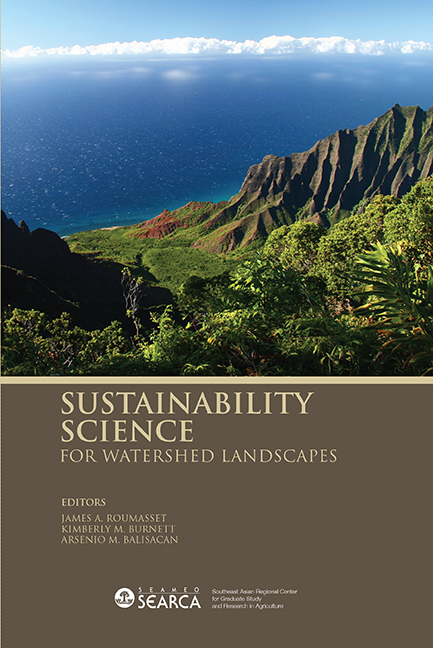Book contents
- Frontmatter
- Contents
- Tables
- Figures
- Message
- Foreword
- Preface
- Acknowledgments
- List of Contributors
- Theme 1 Sustainability Science for Resource Management and Policy
- 1 Economic Policy for Sustainable Development vs. Greedy Growth and Preservationism
- 2 Integrated Watershed Management: Trees, Aquifers, Reefs, and Mud
- 3 Transdisciplinary Research in Watershed Conservation: Experiences, Lessons, and Future Directions
- 4 Payments for Ecological Services: Experiences in Carbon and Water Payments in the Philippines
- Theme 2 Monitoring and Modelling
- Theme 3 Participatory Approaches
- Theme 4 Case Studies
- Synthesis
3 - Transdisciplinary Research in Watershed Conservation: Experiences, Lessons, and Future Directions
from Theme 1 - Sustainability Science for Resource Management and Policy
Published online by Cambridge University Press: 21 October 2015
- Frontmatter
- Contents
- Tables
- Figures
- Message
- Foreword
- Preface
- Acknowledgments
- List of Contributors
- Theme 1 Sustainability Science for Resource Management and Policy
- 1 Economic Policy for Sustainable Development vs. Greedy Growth and Preservationism
- 2 Integrated Watershed Management: Trees, Aquifers, Reefs, and Mud
- 3 Transdisciplinary Research in Watershed Conservation: Experiences, Lessons, and Future Directions
- 4 Payments for Ecological Services: Experiences in Carbon and Water Payments in the Philippines
- Theme 2 Monitoring and Modelling
- Theme 3 Participatory Approaches
- Theme 4 Case Studies
- Synthesis
Summary
ABSTRACT
The importance of consilience among different disciplines to solve global environmental issues has long been discussed among researchers and decision makers. As global environmental problems become more complex in the real world, society calls for transdisciplinary approaches that analyse and solve environmental problems. The watershed is a geographical boundary of ecosystem that supports social and economic activities at the regional scale. The problems associated with watersheds are considered to have multi-faceted aspects. The integrated project-type research creates a new arena for transdisciplinary research. It is possible to integrate research through concepts, methodology, and a common geographical area of study.
The research organisation of three transdisciplinary watershed projects is compared, specifically, the Impact of Climate Changes on Agricultural Production System in the Arid Areas (ICCAP) Project, The Lake Biwa-Yodo River Watershed Project, and Urban Subsurface Environment Project. In the three projects, the research organisations evolved to pursue mission and transdisciplinary goals. Various tools for integration were observed, which included the comparison of spatial and temporal changes, generation of indicators, development of coupled models, and communication among researchers. More importantly, a tool to integrate scientific knowledge and transdisciplinary communication with the stakeholders of the watershed was used to disseminate scientific information for resource management.
INTRODUCTION
The importance of consilience among different disciplines to solve global environmental issues has long been discussed among researchers and decision makers. Society calls for transdisciplinary approaches to analyse and solve these worsening global environmental problems.
The watershed is a geographical boundary of ecosystem that supports social and economic activities at the regional scale. The problems associated with watersheds are considered to have multi-faceted aspects. These include the spatial and temporal aspects of material flow and balance, the present and future climate conditions, resource use, hierarchical structure of social and cultural organisations, and ownership. Thus, the sustainability of watershed requires a “synthesis of knowledge from different specialised fields of human endeavor” (Wilson 1998).
This chapter tries to review some transdisciplinary research projects that have been implemented for watershed management.
- Type
- Chapter
- Information
- Sustainability Science for Watershed Landscapes , pp. 77 - 102Publisher: ISEAS–Yusof Ishak InstitutePrint publication year: 2010



